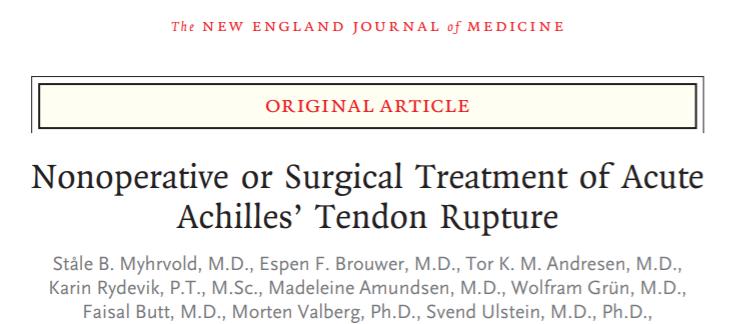▎ WuXi AppTec content team editor
For many professional athletes, and sports enthusiasts, the biggest nightmare is a sudden sharp pain in the foot during intense exercise, and sometimes a special sound can be heard, which means that the Achilles tendon may be torn.
The Achilles tendon, which connects the muscles on the back of the calf to the calcane, is one of the most commonly torn tendons in the human body. But after a laceration occurs, which treatment is better? Is it surgery or a cast to aid rehabilitation?
To address this, a new study published in the New England Journal of Medicine followed 526 patients with Achilles tendon tears. Most of these patients were men of an average age of 39 years, and some underwent minimally invasive surgery, some underwent standard surgery, and some underwent non-surgical treatments, such as physical therapy such as foot fixation. These patients are told to avoid strenuous activity for six months.

After about a year, the researchers followed all patients. They found that recovery varied slightly between patients who received different therapies. Among patients who did not undergo surgery, more people had re-injuries to the Achilles tendon, with about 6.2% experiencing the problem and 0.6% of patients who underwent surgery.
However, more patients undergo surgery report nerve damage, especially in minimally invasive surgery, compared with 2.8% and 0.6% of those who undergo standard surgery and those who do not have surgery.
Image credit: 123RF
According to the study, Matthew Costa, a professor at the University of Oxford, concluded: "For the average person who is not a professional athlete, no surgery can be considered. He noted that the benefit of surgery is to reduce the likelihood of re-injury, but it also increases the risk of causing complications of infection.
Some people who have long realized that their Achilles tendon injuries and have not seen a doctor in time can opt for surgery because their Achilles tendons may not heal normally. The researchers point out that patients should have more discussions with their doctors to decide which approach is more suitable for them. When the Achilles tendon is ruptured, the body undergoes a natural healing process, but if the healing is not in the ideal position, the surgeon may have to repair it through surgery.